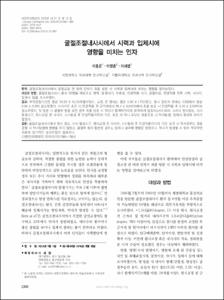굴절조절내사시에서 시력과 입체시에 영향을 미치는 인자
- Keimyung Author(s)
- Lee, Chong Eun; Lee, Se Youp
- Department
- Dept. of Ophthalmology (안과학)
- Journal Title
- 대한안과학회지
- Issued Date
- 2010
- Volume
- 51
- Issue
- 10
- Abstract
- Purpose: To evaluate the factors affecting the visual acuity and stereoacuity of patients with refractive accommodative esotropia who have successful optical alignment obtained by refractive error management.
Methods: The charts of 60 patients, including medical history, age of onset, chief complaint at first visit, age at which glasses were first worn, refractive error, visual acuities with and without glasses, angle of deviation, and stereoacuity were retrospectively reviewed.
Results: The mean follow-up period was 59.20 ± 40.26 months, and the mean hypermetropia at the initial visit was 4.90 ±1.75 diopters (D). Fifty-three patients had decreased hypermetropia, with a mean of 0.94 ± 0.91 D, while seven patients had increased hypermetropia, with a mean of 0.38 ± 0.17 D. The mean deviation at the initial visit was 28.40 ± 9.05 prism diopters (PD) at near without glasses and decreased to 3.20 ± 3.50 PD with glasses at the final visit. Children who had anisometropia at the initial visit had a higher prevalence for amblyopia at the final visit (p = 0.000). However, the degree of hypermetropia, age at onset, deviation before glasses correction, interval from onset to glasses correction, and amblyopia at diagnosis were not significant risk factors for amblyopia or anomalous streoacuity at the final visit.
Conclusions: The degree of hypermetropia, age at onset, deviation before glasses correction, interval from onset to glasses correction, and amblyopia at diagnosis were not significant risk factors for amblyopia. However, anisometropia was a significant risk factor for the development of amblyopia in patients with refractive accommodative esotropia, and these children should receive careful and long-term follow-up management.
목적: 굴절조절내사시에서 굴절교정 전 여러 인자가 최종 방문 시 시력과 입체시에 미치는 영향을 알아보았다.
대상과 방법: 굴절조절내사시 환자 60명을 대상으로 병력, 발생시기, 주증상, 안경착용 시기, 굴절이상, 안경착용 전후 시력, 사시각, 입체시 등을 조사하였다.
결과: 추적관찰기간은 평균 59.20 ± 40.26개월이었다. 교정 전 원시는 평균 4.90 ± 1.75D였고, 원시 정도의 변화는 53명에서 평균 0.94 ± 0.91D 감소하였다. 사시각은 초진 시 안경착용 전 근거리에서 28.4 ± 9.05PD에서 최종 방문 시 안경착용 후 3.20 ± 3.50PD로 감소하였다. 첫 방문 시 굴절부 등을 보인 경우 최종 방문 시 약시가 통계학적으로 유의하게 많았다(p=0.000). 그러나 원시정도, 사시발생시기, 원시교정 전 사시각, 사시발생 후 안경착용까지의 기간, 초진 시 약시 유무는 최종관찰 시 약시발생, 입체시 결과에 차이가 없었다.
결론: 굴절조절내사시에서 원시 정도, 사시 발생시기, 원시교정 전 사시각, 사시발생 후 안경착용까지의 기간, 초진 시 약시유무는 최종 관찰 시 약시발생에 영향을 주지 않았고, 굴절부 등이 동반된 경우는 입체시 결과에 영향은 없었으나, 약시가 발생할 수 있어 적극적인 치료와 장기적인 경과관찰이 필요하다.
- Alternative Title
- The Factors Influencing the Visual Acuity and Streoacuity Outcome in Refractive Accommodative Esotropia
- Publisher
- School of Medicine
- Citation
- 이종은 et al. (2010). 굴절조절내사시에서 시력과 입체시에 영향을 미치는 인자. 대한안과학회지, 51(10), 1380–1384. doi: 10.3341/jkos.2010.51.10.1380
- Type
- Article
- ISSN
- 0378-6471
- Appears in Collections:
- 1. School of Medicine (의과대학) > Dept. of Ophthalmology (안과학)
- 파일 목록
-
-
Download
 oak-bbb-02595.pdf
기타 데이터 / 420.18 kB / Adobe PDF
oak-bbb-02595.pdf
기타 데이터 / 420.18 kB / Adobe PDF
-
Items in Repository are protected by copyright, with all rights reserved, unless otherwise indicated.